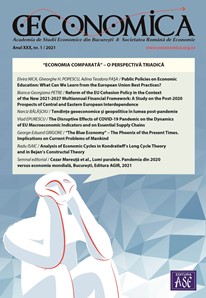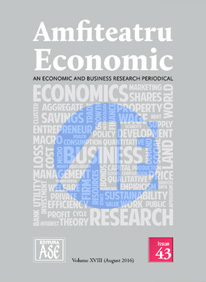
The Piketty-ism – a Childhood Illness for the 21st Century Concluding Reflections on Capital in the Twenty-First Century
The destiny of Piketty’s book was dictated by the subject he analyzed, the amount of ideology he reflected on and the style used to express his thoughts. In other words, Capital in the Twenty-First Century will find adherence and appreciation from all those who think, act and design their joys of life similar to its author. We refer here to those who support the division of the pie rather than its baking; those who place equality of outcomes before freedom and who do not believe that inequality is also central to the creation and natural order of the world; those who congenitally refuse inheritance and shun the rich; those who are allergic when they hear of rent, capital and the “harsh reality” of money multiplication by themselves; those who do not recognize the entrepreneur’s right of being paid for both the risk assumed and the increment of inspiration in anticipating business trends; those who fall under the spell of the authoritarian temptation of an omnipotent global government or those who, under the protective umbrella of a welfare state, quarrel with the bourgeois ethic, find themselves entitled to claim what is not rightfully theirs; those who are natural born strikers. We should also include here those who got from Piketty’s concerns credible arguments in supporting the welfare of states or central banks above that of individuals. There are also those who let themselves be fooled by the author’s siren song, without a clue as to what they are contemplating! And we have already seen, they are more than just a few. This is the passionate success of the book. From the scientific point of view, however, we are not dealing with a great book of this century, in spite of the faddish acclamation of Nobel potential.
A book “Marxed” to market
I have no reluctance in saying that Thomas Piketty has no chance of becoming a “revolutionary” economist if he insists on the chosen direction. Trying to develop himself in Marx’s swirl, he is still far from Marx’s skills. Even if he has fixed, like his mentor, a predetermined aim of his analysis – dismantling the capitalist system – in the pursuit of its fallible logic, Piketty remains strong in will, but short on ability. He does not lack the flair and he acknowledges that by filling the stage with global- and macro- variables, on a bedrock of empirical support, he is likely to impress. It is possible that many will fall for this statistical juggling if they fail to notice that he stubbornly confuses the interactions between major variables and he does not put them into connection with the key-institutions – formal and informal – of capitalism, which gave its cadence and resilience to the major shocks this system has been exposed to. They might also fail to acknowledge that, undisturbed by the lack of a common denominator, Piketty adds to the same pot the capital, high incomes, inheritances, etc. to create sensation and to impress upon his readers the image of a mountain of deaf indifference and immoral accumulation which has formed in strident mockery of “bottom percentile”, blocking its advancement. However, I do hope that it is at least observable that Piketty willingly runs away from the great economists that might have helped him to judge correctly. We understand his strategy insofar as we realize that what he has wrought for himself is less science and more dialectic and, therefore, Smith, Say, Mises, Hayek or Nozick would have hindered his plans and would have undermined his self-inflated construction. We would think otherwise if we did not notice that the chorus of his book is the immorality of inequalities in the world. There is no serious scientific analysis on the accumulation of wealth; just a pit-stop, on a thousand pages, for visceral criticisms upon the way it is distributed.
A tribute to… redistribution
Against this background, Piketty’s rich people are all ugly. He does not divide them into good rich people and bad rich people. He does not blame only the latter for accumulating their wealth by violating the rules of the game. The first are also blamed! He does not even stop to ask himself whether the heiress of L’Oréal business created jobs. Because she does not sign daily into a registry and she does not figure in a timesheet for some boss, it is enough for him to include her into the world of those who infest the social organism. This is the atmosphere, the ideological ether in which Piketty flares his impressive amount of energy, synthesizing a vision and an ideology belonging not to the rigorous scientist, but to some exalted prophet of utopia in rebellion against the immorality of the world’s inequities.
I am not saying I do not recognize any merit of Piketty’s. On the contrary – sending Economics to its status of “political economy”, the criticism of excessive adherence to mathematical models of economic analysis in detriment to the conceptual, highlighting the harmful role of tax havens, as well as the wide timespan in which he conducted his analysis, the relevant and timely picture of the global economy with all its conflicting realities, with phenomena of domination and interferences between national interests and those of national companies, and so on, are features fully deserving of all the attention. But the book does not host the much needed segments of dialectics of the debate of great ideas. The empirical foundation, otherwise impressive if real, cannot support sound demonstrations because, at the theoretical level, Piketty’s dialogues are not based on purely scientific criteria. His stance is one of automatic acknowledgement of those he agrees with, the selection being made ideologically. In his book, Piketty does politics. We can understand why and how he does it by going to its ideational origins. And we can also understand why, saying precisely what it is expected to be heard by all the Piketty-ist leaders of the world, working backwards from the conclusions, the book of our economist will provide “scientific” support for their preferred redistributive policies.
A “litany” against fortune(s)
In absolute value, in modulus, as mathematicians say, Piketty does not seem a bad person, nourishing evil against humanity. But if you read not only the utopians, but also some academic socialists, does one catch glimpses from there of malice? Certainly not! Until learning about the dictatorship of the proletariat and the orderly common good from Leninist, Trotskyist and Stalinist speeches, the good-hearted sentiments of socialist authors are disarming! Likewise, the beauty of their lessons about the absolute communism is simply captivating, like any utopia. Piketty, as it turns out from the entire book, has been bitten by the red ant of universal utopia. Piketty belongs to this ideology – through it he defines himself as an economist and to it he subordinates his scientific labor. This is the main flaw of the book. Out of context, some of his analyses are interesting. Interesting are also Marx’s analyses about money, rent, capital, income, profit, etc. But they remain interesting only until they are subordinated to the ideological shackles for which they are meant. It is the same with Piketty. At diagnosis level, we cannot refuse his right to dialogue. But at project level, we have serious problems. And we have them because the area from which they emanate is the spawning ground of the great inventors of utopias, as well. The biggest issue is the galactic government, with its global tax. How does he imagine it, who implements it? Capitalism concurrently means culture; one that differs, with respect to the economic, social, political paradigms in the Judeo-Christian civilizational space from that in the Muslim, Hindu, Confucian, etc. ones. What kind of world government would be able to tie the so many diverse realities? It must be a really special one in order to be able to do that. Anyway, you need a high dose of utopia to concentrate your energy on such a thing. But I am confident that many readers will forgive him for this utopianism, reckoning it as the price paid in his fight against inequality. They will get over this and they will get over its obsessive litany against inheritance, ever present throughout the book and for which he provided plenty of data.
The devil hides in the… data
The great disappointment for those who will realize the balancing act Piketty is trying to achieve between science and a large amount of ideology does not even come from the messianic universalism employed to offer the same solution as relevant on a planetary scale. Working with a sample that only he believes to be representative, he sends his ideas to find practical application in places that have no connection with his type of thinking. Furthermore, my sadness does not come from the theoretical references he undertakes. He has the right to dialogue with Lenin, Stalin, Stiglitz, Krugman, Smith or the head of the global government. He is a free man. It can be easily ascertained in the book who were the ones put in brackets and who have been his counselors. Even if this upsets us, it is his choice. But we reckon that he deeply disappoints and places himself, inexcusably, in the world of dangerous fantasy when he finds positive landmarks in the register of facts that occurred under the theoretical endorsement of names which history totally disavowed. If he does not know that the socio-economic dynamics produced following Marx’s line, translated into practice by Lenin, Stalin, Mao and all their descendants was a breakdown of any expectation of historical progress, this is a highly serious matter for a director at Hautes Études en Sciences des École Sociales in Paris. He can compare himself with anybody, including with Marx and Lenin, but without giving us positive benchmarks in the facts derived from their thoughts. To try to outline the type of state suitable for the 21st century and to appreciate, in 2014, as prestigious, and therefore replicable, the statist economic system established by the Bolsheviks after their Great Revolution is a line of thinking that says all about the shape of the shadow cast by our author.
A trap for untrained minds
When you write about a book, it is a good habit to recommend it or to at least say that it recommends itself. In the end of her splendid essay – “Measured, Unmeasured, Mismeasured, and Unjustified Pessimism: A Review Essay of Thomas Piketty’s Capital in the Twenty-First Century”–, Deirdre McCloskey, after recognizing Piketty’s merits, ends sententiously: “It is a brave book. But it is mistaken”. Even though the cited author thinks Piketty’s work is scientifically a mistake, with such a qualification, the book will be read. It is a form of reverse marketing such as “do not eat the forbidden fruit”. Isn’t Mein Kampf wrong? And how wrong! Even though it competes in circulation with the Bible.
I am not in the position to recommend this book with all my heart and with my entire mind! There are too many good books, great gateways towards a healthy knowledge, for my students and Ph.D. candidates to study, including for things like those analyzed in this book. Of course, they will make a halt for Piketty’s work, drawn by the simple and necessary concern of disinterested knowledge. I trust their power in correctly understanding the world presented by him; unperverted and unconverted minds are inclined by their own volition towards the natural and the logical. I also do not doubt the power of discernment of all those who, in the space of ideas I frequent, will put their hands on this book. I am concerned for what the correct reception of Piketty’s message might mean for the masses in the former Communist countries. Here, capitalism has not yet flourished everywhere; and not by its fault, but because of those who have badly managed it. Many failures have fuelled the distrust in the market economy. In this context, Piketty’s book does not offer an adequate framework to explain in these countries what can be done in order to leave behind the specter of Communism and embed trust in the free economy. For this reason I cannot remain contemplative to the gratuities of leaning towards the values of socialism.
Please, read it responsibly!
There is no need for the toxins from Piketty’s book, but for the faith in the virtues of a genuine capitalist system that has brought, independent of our wanting it to succeed or to fail, unprecedented prosperity to the world. And we do not acquire this faith by letting Piketty to settle himself instead of the market economy. Furthermore, in the context of income differences that are still persisting in a harsh gap for the “bottom percentile” (I once again make use of Piketty’s notion), the temptation for egalitarianism is alive and can find support in this book. Personally, I saw Piketty’s “bottom percentile” in action, during the collectivization of agriculture in Romania. I saw what it meant for the poor, partially uneducated, majority to accept that the neighbor is rich not because he works harder, but because his surplus comes from the wants of others. And then the anti-social socialization came into being with disturbing joy. The first enemies of Romanian kulaks were not the Communists, but their own neighbors.
And one more thought for Professor Piketty! I myself do not like inequality. Who does? But we have no choice; they are part of the natural order of the world! However, I dreadfully fear equality. I wish I were at least ten times more capable than I am! If I am! I would have liked to inherit Rockefeller and that my mother gave birth to me in Vienna and not in a typical village in Romania, which suffered through one of the harshest Communist experiences. But I am angry neither with my mother nor with the lucky heirs of the above mentioned billionaire. I identify with my country’s ideals and I forge my life projects in this area. I lack almost nothing, but I wish I had more. For this I do not get mad at anyone. I get up on Monday morning and get to work. I finally enjoy freedom, so that, for this, I can say I find your book too big and too infested with “-isms” and utopia to be able to seize on its scientific core.








